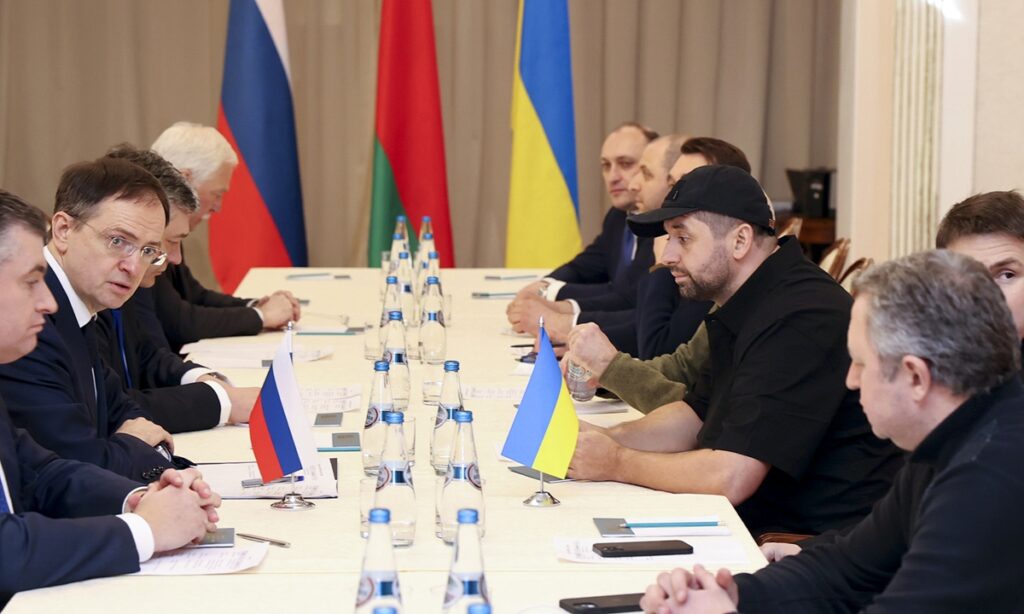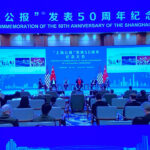Two sides likely to find some common ground on a ceasefire: expert
High-level talks between Kiev and Moscow finally began in the Ukraine-Belarus border on Monday. Chinese experts acknowledged the significance of the talks, which at least reflected some willingness from both sides, but predicted that hopes were not high for a major breakthrough during the first round of the talks as the conflict has reached its fifth day.
There will be some ups and downs in the talks as the two countries need to sound out each other’s bottom line for several rounds, analysts said, but Russia will hold an overall strong position in the talks.
They also raised concerns that the US-led West may not want to see a reconciliation between Russia and Ukraine very soon and the US and West are more interested in destabilizing government of Russian President Vladimir Putin by exerting sanctions, which could cause severe difficulties for Moscow, leading to mass anti-war movement.
The exact location for talks is being kept secret for security reasons. Organizers of the talks call it “the fisherman’s hut.” A source familiar with the Russia-Ukraine talks told China Central Television that the venue of the talks is not far from the Alexandrovka border checkpoint between Belarus and Ukraine.
Ukrainian President Volodymyr Zelensky’s office said the Ukrainian delegation consists of Ukraine’s defense minister, deputy foreign minister, and four senior lawmakers and presidential office staffers.
Russia’s team is composed of Moscow’s ambassador to Minsk, its deputy defense minister, a senior lawmaker and President Vladimir Putin’s aide Vladimir Medinsky.
Earlier, the president’s office said Kiev’s goal for the discussions was an immediate ceasefire and the withdrawal of all Russian forces from Ukraine. But even the president himself said that he expected little to come of it.
The Kremlin declined to share the Russian delegation’s negotiating position Monday, saying “the negotiators should talk in silence.”
Ukraine has released a lot of information ahead of the talks, leaving people an impression that “dragging out the conflict” is the country’s strategy. As Russia wants a quick resolution, Ukraine will benefit if the war drags on and a steady support from the West is poured in, analysts noted.
Zhao Junjie, a research fellow at the Chinese Academy of Social Sciences’ (CASS) Institute of European Studies, told the Global Times on Monday that the talks were anticipated, but may not necessarily bring peace to the raging conflict at this time when “their battle has just begun” and the two sides are unlikely to bring all their cards to the table and make too many concessions.
As the two sides are determined to getting what they want, the talks will be a long process in which they will explore each other’s bottom line. Despite that, it is still a good start for cooling down tensions when the two countries could sit down to talk and show the world that they are making the effort, Zhao said.
Wang Yiwei, director of the institute of international affairs at the Renmin University of China, said Russia is aware that the escalation of sanctions imposed by the West, if prolonged, will drag down its economy and will not be in Russia’s long-term interests.
Monday’s talks show that Russia is willing to negotiate with Ukraine to solve the issue, which also lets the world see it is addressing the concerns of the international community, Wang said.
Russian Defense Ministry spokesman Igor Konashenkov said on Monday that the Russian Armed Forces have hit 1,114 Ukrainian military infrastructure objects. The military objects included “31 control points and communication centers,” Konashenkov said, citing a statement published by the ministry.
Russian air forces have gained air supremacy over Ukraine, and the armed forces have taken control of the Ukrainian cities of Berdiansk and Energodar, the spokesman added.
But the Ukrainian army said on Monday that the situation in Kyiv was still under its control.
EU toughens up
The talks also came as the European Union (EU) moved to impose tough new economic sanctions on Russia. The EU agreed on Sunday to provide €500 million in arms and other aid to the Ukrainian military as it battles Russia, in a move the bloc described as a “watershed moment” in its history.
Under the plan, as first reported by Politico, the EU will use an off-budget so-called “European Peace Facility” financing instrument with a ceiling of €5 billion that can be used to provide military aid.
Zhao believes that the EU seeks to demonstrate its strategic autonomy in international affairs and a vital role in solving the Ukraine crisis to assert its status in the new European security architecture that will be reshaped in the future. After Ukraine receives NATO’s advanced weapons, Russia would have less leverage in the war. When there is no way back, Russia would only respond with stronger measures and achieve greater combat results. Such aid to Ukraine may further fuel the fire in the region as Russia is expected to take stronger measures to gain more bargaining chips for talks, he noted.
One day ahead of the talks, Putin ordered Russia’s nuclear deterrent forces to be put on high alert. Chinese military experts believe this is a move from Putin to lay his cards on the table, warning other countries that have nothing to do with Ukraine not to intervene in the peace talks between the two sides or in Ukraine’s internal affairs, let alone endanger Russia’s national security.
Analysts noted that Russia holds an overall strong position, which can be seen from the choice of the negotiation venue.
Russia first put forward holding the talks in Minsk, but Ukraine refused, and required a member of NATO in Eastern Europe or Turkey. Later, Ukraine agreed to hold the talks at the Ukraine-Belarus border specifically in the Ukraine side. The Belarus side released information on noon Monday that the negotiation site was ready and the Ukrainian delegation had arrived in Belarus, which means that Ukraine made a big compromise on the location of the talks.
Where the two sides are likely to find some common ground is probably a ceasefire: the Ukrainians could demand an unconditional ceasefire while the Russians may set a lot of conditions on that, observers said, noting that Ukraine’s neutrality between NATO and Russia is also likely to become a focus of discussion.
Cui Hongjian, director of the Department of European Studies at the China Institute of International Studies, told the Global Times on Monday that a further escalation of Western sanctions against Russia will not be conducive to de-escalation and will compress the space for diplomacy. Under intense pressure, Russia would most likely shift the pressure to the battlefield, hoping for a clear victory on the battlefield, such as capturing Kiev at all costs or getting the Ukrainian military to give up its resistance quickly.
Chinese Foreign Ministry spokesperson Wang Wenbin said at Monday’s routine press conference that China follows the situation in Ukraine closely and supports all efforts conducive to easing the tension and a political settlement.
China has noted the statements made by relevant parties on the nuclear issue. I would like to stress once again that the legitimate security concerns of all countries should be taken into account when it comes to security in Europe. Against the backdrop of NATO’s five rounds eastward expansion, Russia’s legitimate demands for security should be given attention and properly addressed. All relevant parties should remain calm and exercise restraint to avoid further escalating the situation, Wang said.
All Moscow’s security concerns must be taken into account for settlement in Ukraine, Russian President Vladimir Putin said Monday during a telephone conversation with French President Emmanuel Macron.
Putin reiterated that a settlement would only be possible if Russia’s security concerns were taken into account, including “Russia’s sovereignty over Crimea,” as well as the country’s commitment to solving the tasks of Ukraine’s demilitarization and denazification, and the issue of Ukraine’s neutral status, the Kremlin said in a statement.
Vladimir Medinsky, (second left) head of the Russian delegation, and Davyd Arakhamia, (third right) faction leader of the Servant of the People party in the Ukrainian Parliament, attend peace talks in Gomel region, Belarus, Monday, Feb. 28, 2022. Photo: AFP




